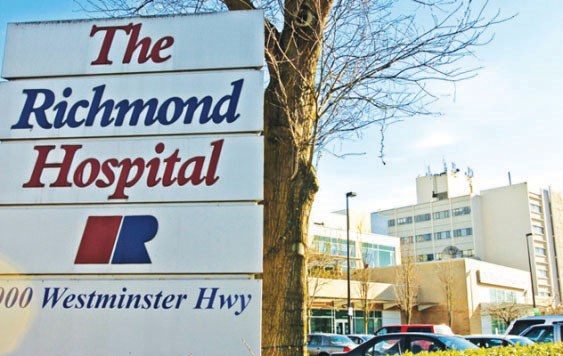A “realignment of resources” at Richmond Hospital may have released $1.4 million for 30 new residential care beds for seniors.
But it could also result in a number of front-line nursing staff at the hospital being cut as a consequence.
Just how many staff are involved and at what level is unclear, as Vancouver Coastal Health (VCH) and the B.C. Nurses’ Union (BCNU) have 60 days to work through the impacts of what’s being called a “bed map redesign,” which will free up acute care beds.
VCH said in a press release that a “small number of positions at Richmond Hospital will be impacted by the changes,” before explaining to the News that 25 staff (or full-time equivalent) will be impacted.
VCH's public affairs officer, Viola Kaminski, said that current vacancies and impending retirements will "offset the impact to unionized staff" and that "all nursing staff will receive job offers in VCH, although their role may change."
As well as the job losses, the nurses union fears, given Richmond’s ageing demographic, that the beds released by the changes will fill up again very quickly.
And there are also concerns that the likes of higher qualified RNs (registered nurses) and LPNs (licensed practical nurses) could be replaced by lower paid care-aids.
“Right now, (VCH) is not sure about the net loss of jobs but we’re being told that they’re not hiring a whole bunch of care-aids,” said the BCNU’s regional chair for Richmond and Vancouver, Lauren Vandergronden, an RN.
“There is still a lot of concern, however, among the nursing community at Richmond that some of them will be replaced (by care-aids).
“The employer is meeting with staff every day to talk through what’s happening.”
The impending changes to realign inpatient beds at the hospital will “better meet the needs of the community,” said the VCH press release.
The bed map redesign — which involves outlining the location and type of each inpatient bed in a hospital and then shifting or amalgamating beds on individual units — has not been done in more than a decade.
However, over the last year alone, the hospital saw an eight per cent increase in emergency department visits, which, in turn, has led to an increase in hospital admissions.
The redesign has enabled VCH to reinvest approximately $1.4 million into community services, providing Richmond residents with access to 30 residential care beds at the Delta View Habilitation Centre.
This, according to VCH, will help reduce the number of alternate level of care (ALC) patients — usually elderly patients who no longer require acute care but who are waiting for transfer into long-term care or into their homes with appropriate supports — and ease congestion in the health care system.
Vandergronden said the hospital may be freeing up acute care beds with the changes, but it poses “huge questions” for the future at the hospital.“It’s just a Band-Aid really and moving these patients to Delta View is not the answer,” she said.
The changes will “better align services to meet the care needs for patients in hospital and clients in the community,” said Richmond Hospital’s interim chief operating officer Dermot Kelly.
“Our population is changing, and the way we provide health care also needs to change to best care for our patients.”
Before deciding what changes to make, the hospital assembled an interdisciplinary team of staff and physicians to examine its current services and how they could be improved.
VCH say Delta View will provide a more suitable care setting for patients who no longer require the short-term, intensive level of care provided in a hospital.
“While Delta View will help us meet our immediate residential care needs and improve patient flow at Richmond Hospital, we’re continuing to develop a long-term plan to expand residential care capacity in Richmond,” Kelly explained.
The realignment will also create two new units: a sub-acute activation unit, which enhances recovery for older adult patients, and a short stay pediatric unit.
VCH is reinvesting another $200,000 into strategies designed to improve care and patient flow at the hospital including the introduction of seven-day-per-week frontline nursing leadership; a realignment of nursing, allied and support services to better match resources to patient needs; and the implementation of a new patient flow and discharge planning model.



